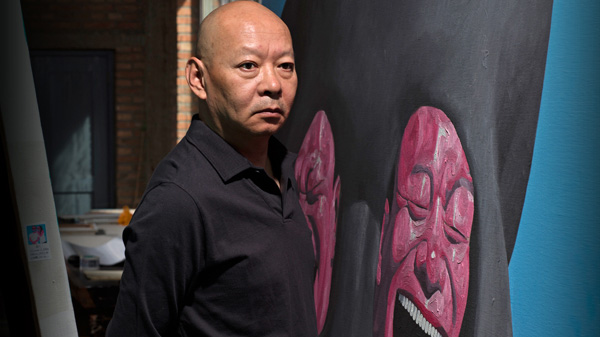
Interview: Yue Minjun, the artist behind the famous laughing face portraits
Yue Minjun, whose colourful depictions of maniacally laughing figures have captured the imaginations of critics and collectors alike, is commonly regarded as one of China’s pre-eminent contemporary artists…
How did you become one of China’s most significant and influential contemporary artists?
Well, it’s a little complicated. I was to drawn to art from a very young age. I was always very fond of using images and drawings to express my inner feelings and emotions. It was the way I tried to make sense of the things and events that surrounded me. As I grew older, I realised it was something that I wanted to pursue more seriously. That’s when I decided to devote myself to art – and painting in particular – full time. Thankfully, I eventually managed to carve out a career for myself in this field…

Along the way, you worked as an electrical engineer…
That was just one of the many jobs I had after I graduated from high school. At that time, I didn’t really have any real leaning towards a specific career. Instead, I thought I would take my time and explore the avenues opening up in the art world, something that allowed me to escape the limitations of the traditional education system.
Eventually, the pressures of work got me to a point where I could no longer paint or expand personally in any meaningful artistic way. That’s when I decided to enrol at a professional art school. Thinking about it now, It might have been the most important decision I ever made and was a key element in my eventual success.

After that, you moved to Beijing…
I decided to move to Beijing as I wanted to pursue a full-time career in art. I just loved art, and when you love something, sometimes you have to sacrifice everything else for it. Sometimes you choose an extreme path. I made a conscious choice to forsake everything else to pursue my one true passion in life.

Today, you are internationally known for your iconic laughing face portraits. Where did the initial inspiration for these particular works come from?
Actually they are all derived from my early life experiences. I was born at the tail-end of the Chinese Cultural Revolution, so there were a lot of government-commissioned propaganda paintings around that illustrated the apparent joy of being working class. In most of the these paintings, the subjects were laughing, but it was never clear why. People would be standing around Chairman Mao or around the produce resulting from a clearly bumper harvest, laughing all the while. I thought such images were somewhat ironic, so the inspiration for many of my later works were deeply rooted in this early experience.

Many people see your work as steeped in cynicism and being quite critical. Do you agree?
Well, yes and no. I think one of the biggest challenges in creating the laughing series was that there is really only one primary face on show and that it was always laughing. The challenge lay in creating a new story with every iteration and being able capture a new scenario every time I decided to add to the collection. They also needed to evoke different emotions and prompt the audience to consider what was really being said…

Your work often features strong colours and repeated motifs..
I think paintings – and any artwork in general – are really a reflection of their creators’ states of mind. Even when the completed piece is not a realism-driven encapsulation of an earlier experience, it’s still something very much anchored in reality, whether in terms of being an accurate depiction or a more symbolic recreation. For me, the use of strong colours and repetition actually come from the way I view the world.

You’ve said before that freedom is a major theme in your work. How do you, personally, define this fairly contentious term?
I don’t think I could explain that in just a few words, but I will try. For me, freedom is really how you relate to other people. When considering the notion of freedom, most people only think about themselves, while I believe it is actually deeply rooted in society’s sense of community and the relationships built within that framework.

What are your views on China’s current approach to art education?
I think the system is quite rigid. For instance, the programmes can’t be tailored to the needs or interest of any one student. It’s all homogenised and, should anyone want to veer away from the traditional approach, they will pretty much have wasted four years of their life. At the same time, it’s difficult to improve the system when there are so many students currently within it. As a result, I think it’s vital for serious students to be flexible enough to reposition themselves in terms of favoured mediums and overall approach.
Thank you.
Interview by: Dai Xuan
Text by: Tenzing Thondup
Photos: Zhang Yunjiang
Wardrobe: Loro Piana







